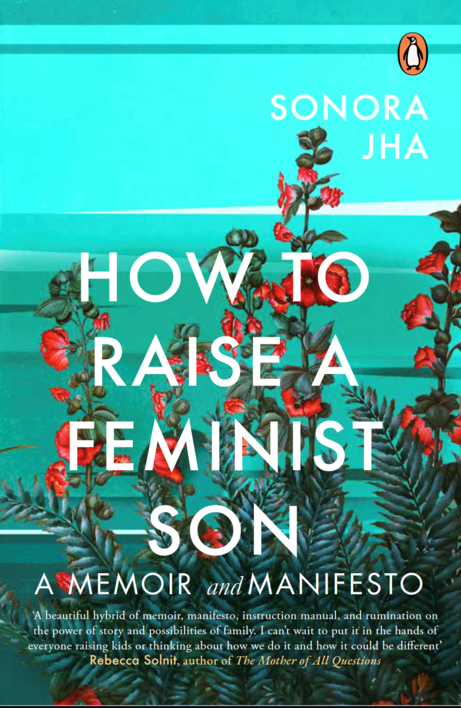By Neha Kirpal
Essayist, novelist, and professor of media and politics at Seattle University, Dr Sonora Jha had a successful career as a journalist in Mumbai and Bengaluru before moving to Singapore and then the United States to earn a PhD in political communication.
Her new book How to Raise a Feminist Son: A Memoir and Manifesto (Penguin Random House, Rs 399) follows her personal struggles and triumphs as a single mother and an immigrant raising an American feminist son.
Sonora is also the author of a novel Foreign (Random House India, 2013), and co-editor of New Feminisms in South Asia (Routledge USA, 2017). She talks to us about her latest book, how the #MeToo movement differs in the US from South Asian countries, and how parents can shield children from the influence of patriarchal attitudes.
How did you decide to write your latest book How to Raise a Feminist Son?
I was writing a memoir, and then, every now and then, as something came up in the news, I would write a political / personal essay around issues related to masculinity, boys, and feminism. Those essays would get a huge response, with people writing to me from across the world. I sensed a hunger, a need for a reckoning in society with the way we raise men. I decided to write a feminist memoir on how I raised my son to be a feminist. It became a personal story and a manifesto for others to come along.
Why do you feel it is more important than ever in this day and age for our sons to be raised as feminists?
Raising boys to be feminists is an act of love and compassion towards them. Not only do they work to empower the girls and women in their lives, they also then empower themselves to laugh in the face of the kind of masculinity that traps them into being hard, aloof, alienated, emotionally unavailable, stoic. They can have more equal and satisfying partnerships if they’re free to feel the whole spectrum of emotions available to all humans.
And imagine how our world would be if it were led by compassionate leaders – women and men – who didn’t have to be brutal to other nations.
Tell us how the personal experiences of raising your own son Gibran helped shape this book.
I learned more in the moments in which my son and I floundered with feminism than in moments that were easy. And a lot of the “raising” of a feminist son was going on organically – in the moments of fun, for instance. The first chapter is about how I raised a feminist at the movies. So, each chapter has an anecdote from our lives and how it blended in with the feminist enterprise.
As part of the book’s research, you interviewed psychologists, researchers, scholars, and parents. What were your most interesting findings?
I feel so fortunate that all these people were so enthusiastic about talking to me. It’s as if we’re all rolling up our sleeves and saying, “Okay, yes, let’s do this!” That enthusiasm itself was an interesting finding. Another thing I found interesting was that there’s such a yearning among boys, to be tender and to connect with others, rather than be sardonic or self-sufficient.
How can parents shield their boys (and girls) from the influence of patriarchal attitudes that are reinforced time and again in popular culture, the media, and the world around us?
I’d say we can’t “shield” them, but we can disarm some of the power of those patriarchal influences. With media, I highly recommend talking, talking, talking to them. Watch things with them, be open, don’t be judgmental. Poke fun at stereotypes. Reinforce and reward those media and those relationships that affirm gentleness in boys and centre the stories of girls and other genders. With relatives, decide if you can reason with them and recruit them to help in your endeavour, or reinforce your different values with your child, or then draw boundaries.
Your debut novel Foreign deals with the grim subject of farmer suicides in Vidarbha. How were you drawn to this theme?
Back in 2007 or 2008, I was stunned that the story of farmers’ suicides wasn’t drawing the attention of the world and wasn’t even getting its deserved attention in India. I started examining it as an academic research project. I had done rural reporting from across India back when I was a journalist in India. But, when I went to Vidarbha to do interviews in farming communities, I realised that I wanted to write this story as fiction. It allowed me to write more truthfully and do justice to some of the truths that farmers’ families had told me.
What is your take on the #MeToo movement? Does it differ in the US from South Asian countries? Do you see the movement leading to a more gender-neutral workspace?
It’s one of the most significant and long overdue moments of reckoning for humanity. The differences are minimal between the US and South Asian countries. One thing I will say is that women in India – especially Dalit women – have been speaking of sexual assault and harassment for decades, but we didn’t seem to care because we wanted to present this myth to the world that “such things” didn’t happen to girls and women in middle / upper caste / class families.
India has a horrific rape culture. We have hidden it well. We need to emerge from our culture of “shame” so that the men around us can no longer prey on our girls and our women. In the US, people need to scratch through the veneer of “first-world values” and take a good, hard look at how they have held women back and abused them at the workplace while claiming to be “the leader of the world.”
Do power structures in workplaces differ in the US compared to India? What are some of the factors like caste and class that make it inequitable, hostile working places?
The US is only now beginning to get honest about its deep, systemic racism and sexism at the workplace. Women here are paid less than men. Women of colour are paid even less. People of colour overall, especially Black, Indigenous and Latinx people, are discriminated against in pay and promotions.
In India, of course, we believed we had moved past caste discrimination, but of course, we haven’t. But I do believe we don’t have a glass ceiling operating in quite the same way for women as it does in the US. Here, even an upper-class, white woman with connections in high places has been denied the presidential office. In India, privileged women aren’t held back in the same way.
Overall, neither of these countries is anywhere close to equity for women and people of colour / lower-caste people. Perhaps we can start by raising boys to see these things and do something about it.
Who are some of your favourite feminist writers?
Ismat Chughtai, Mahasweta Devi, Virginia Woolf, Chimamanda Ngozi Adichie, Rebecca Solnit, Sara Ahmed, Ijeoma Oluo, Honor Moore, Meena Kandasamy, Nivedita Menon, Arundhati Roy, Tressie McMillan Cottom, Judith Butler, Roxane Gay, Soraya Chemaly… the list goes on!
What is your second novel going to be about?
It’s about a white man. That’s all I’ll say for now.
First published in eShe’s April 2021 issue
Discover more from eShe
Subscribe to get the latest posts sent to your email.






Pingback: South Asia Union Summit Led by Women (October 2-3, 2021) – South Asia Union